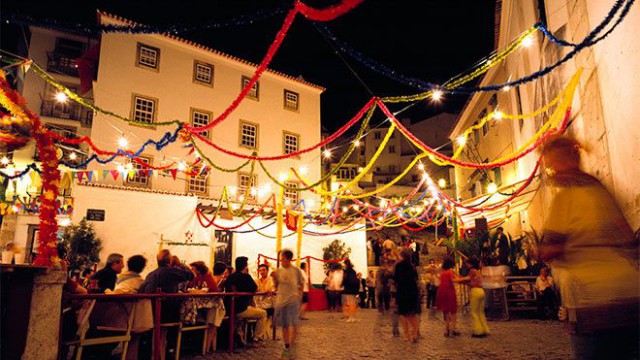 This week, Lisbon will be ramping up to Saint António’s day, the 12th of June and the peak of a wave of street parties. All this month Lisbon will be partying, 'com intensidade.'
This week, Lisbon will be ramping up to Saint António’s day, the 12th of June and the peak of a wave of street parties. All this month Lisbon will be partying, 'com intensidade.'
In what a friend of mine recently dubbed the city’s “hysterical centre,” impromptu barbeques have appeared on street corners and the scent of grilled sardines hangs over each neighbourhood. For the thirsty, and they are a multitude, stalls serving draft Sagres or Super Bock also have popped up.
Every evening, as night descends on the city, tens of thousands of people are taking to the streets to participate in a giant street party that has become an annual international event: the Festas de Lisboa.
Depending on your point of view, the festas can be experienced as the greatest fun ever, or alternatively as a prolonged nightmare. For several weeks in June, the usually easy going citizens of Lisbon divide into two camps: passionate party goers versus the stay-barricaded-at-home lot. Some of the latter group even extend their expression of distaste to fleeing the city.
My hairdresser will be closing her shop in Baixa and heading for her parents’ village for a bit of rural tranquility and, the other day, I heard a couple of expats gentry mutter that they had come to Portugal to find peace, not to spend a month with plugs in their ears.
I don’t think it would be an exaggeration to say that partying and fish are two symbols of the Portuguese identity. Anyone who has lived in Portugal will recognise that the Portuguese embrace party-going with an impressive dedication. The party is an act of defiance, a way of raising your finger at life’s difficulties. Portugal is equally the country in which the nouns sardine (sardinha) and cod fish (bacalhau) are also family names, worn with pride and without ever a thought of exchanging them for something less fishy. Just imagine being called Johnnie Codfish! It wouldn’t really work would it?
The grilled sardines are served between thick slices of bread. It can sometimes come as a surprise to the uninitiated that you are expected to eat everything. That’s right, the tail, bones and – you’ve guessed it – the head as well! This is not actually as bad as it may sound, although I strongly recommend that you first make sure you have some of that Super Bock to hand.
Every year during the Festas de Lisboa our local priest, Padré Edgar – tipped to be a future bishop and even, some parishioners whisper, something far higher – throws himself into the fray, demonstrating not only the Catholic Church’s traditional skill in public relations, but equally a remarkable aptitude for dancing. Much fado is sung – or sometimes croaked – and a crowd of all ages and nationalities sways up and down the Rua das Farinhas. Elderly people, some of whom may never have been outside their country, rub shoulders with hip young citizens of the world.
A charming manifestation of all this are the Saint António weddings, when dozens of happy couples are 'collectively' married, with a splendid civil ceremony at the City Hall followed by a religious consecration in Lisbon cathedral.
What would Saint António himself have made of all this commotion, I wonder?
António was born into a wealthy Lisbon family in 1195 and died thirty six years later in Padua, in Italy. Ordained a priest he subsequently became a Franciscan friar and devoted himself to caring for the poor and sick.
Antóniousually is represented holding the infant Jesus in his arms and is revered for his assistance in finding lost things, which definitely makes him someone most of us could do with a little help from.
During the month of June you can find almost as many effigies of the Saint António for sale in Lisbon as there are sardines waiting to be grilled. António comes in wood, ceramic, wax, plastic, rubber and even marzipan.

_________
The author, James Mayor, is the founder of Grape Discoveries, a wine and culture boutique travel company
See the 'Grape Discoveries' website






















